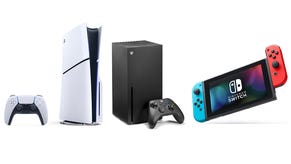Steam Box is exciting - but don't expect it to be "Open"
Valve's entry into the console market is a thrilling prospect, but this isn't about a war between Open and Closed ecosystems
Steam Box prototypes will be in the wild for customer testing in the next three to four months, according to Gabe Newell. Valve has given up on pretending that it's not interested in the hardware game; its ambitions are now pretty clear, and somewhat wider than we expected. Where once the concept of a Steam Box was thought to be simply a minimum set of specs for PC manufacturers to follow in order to get a "Steam Powered" sticker on their boxes, now Newell talks openly about the nitty gritty of hardware challenges like heat and noise management, or building biometric sensors into the custom controller for the console.
"While Steam is an amazing distribution platform that has massively boosted the reach of PC gaming, in many ways it's just as much a walled garden as any of the consoles"
A great many people are hugely excited about the Steam Box. I'm one of them, I confess - I think it'll be just the thing to ease me back into PC gaming, which is where my roots as a gamer lie, but from which I've become increasingly (if unwillingly) estranged. However, I think there are some tough questions and unhappy realities about the Steam Box - whatever final form it may take - that still need to be addressed, especially by the most outspoken proponents of the system.
The crux of the problem is this - Valve's console is already being lauded as a chariot of openness, a triumph for all those who love things that are Open as opposed to Closed, even if some of them aren't very good at defining what those terms actually mean. The box will presumably run either Windows or some Linux variant, and if you want to, you'll presumably be able to leave the Steam environment and pop back to the desktop of that OS and run whatever games or other software you want. (That's the assumption, anyway; we shall see.) That's certainly Open compared to, say, a PlayStation 4 or an iPad, which won't run anything Sony or Apple respectively don't want you to run.
However, there are other facets to this which look less convincing. For a start, while Steam is an amazing distribution platform that has massively boosted the appeal and reach of PC gaming, in many ways it's just as much a walled garden as any of the consoles. Indeed, when I wrote a column recently calling on Sony to lower the barrier for indie studios and small firms wishing to publish PSN games (something they seem intent on doing with PS4), many people pointed out that Steam can actually be an even tougher place to publish a game than PSN - and with the advent of a PS4 based on PC architecture and seemingly more open than ever to self-publishing, that contrast may become rather stark. It's already a stark contrast with the iOS App Store and Google Play, which both place only the smallest of barriers in front of creators who want to put their games in front of consumers.
As such, the question I'm asking myself is this; to an average consumer, who doesn't really want to dig around in another OS that sits behind the "console" interface, is Valve's proposed console really all that different to what Sony are suggesting? It seems to me that while Valve and Sony have started out on very different ideological and technological ground (and as such, are bringing along vocal supporters who originate in diametrically opposed viewpoints), they've converged significantly towards a midpoint. Sony, a company whose consoles have been totally closed ecosystems that were extremely difficult to publish on, has made huge strides towards welcoming self-publishing and liberalising its pricing and business models. Valve, a company with its roots in the open free-for-all of PC distribution, has gradually erected taller and taller walls around its garden and will, in the final analysis, build something that's rather more like a games console than most PC gaming fans are comfortable admitting.
That's fine, of course. If anything, it's a triumph for common sense. The companies that used to build totally closed systems are recognising the immense benefits of more open platforms and loosening the reins accordingly. Companies who were ideologically wedded to the concept of openness, meanwhile, are recognising that a certain degree of gatekeeping helps to ward off malware, fraud, viruses and a host of other damaging software. Perhaps the best thing about Steam, from a personal perspective, is that I trust implicitly that both it and the software it hosts will not damage my computer, which is a very major step for PC gaming but not one that could be taken without first stepping back a little bit from the concept of "openness".
"Valve isn't smashing consoles; it's building one. Open isn't obliterating Closed. All the major players are cherry-picking the best bits of both models"
What I'm trying to challenge here, I think, is the notion that whatever Valve does with the Steam Box is necessarily going to ride roughshod over next-gen console efforts. I simply don't think that's a given. The Steam Box will have advantages - a huge catalogue of games being the most obvious - but it's simply wrong to assume that it's going to be waving some extraordinary flag of democratisation and leading the charge against a closed console market. It's just going to be another walled garden among several walled gardens - the good news being that the walls this generation are going to be much, much lower than they've ever been before. It goes without saying, though, that Xbox and PlayStation are much stronger brands with the consumer market than Steam or Valve, so there's an uphill struggle to be fought in that regard.
From both a consumer and developer standpoint, though, this all looks rather positive. Assuming that the leaks about Xbox 3 are correct, we're talking about three consoles backed by serious, heavy-hitting companies, each based on PC architecture that's pretty straightforward to develop for, and in the case of Valve and Sony at least, each courting the notion of openness and self-publishing. That level of competition is very, very healthy indeed - so much for the notion that the console market is moribund and set for an early grave. Consoles are changing and adapting to new conditions; not extinction but evolution. It's great to see Valve being a part of that process and helping to knock down the utterly artificial barrier between PC and console gaming, which have always had far more commonalities than differences.
Developers, publishers and others involved in the industry simply need to be careful about how they conceptualise this shift. There is going to be a lot of fanboy nonsense written and spoken in the coming months about Valve turning up to "smash" the consoles, or about how "Open" is going to obliterate "Closed". Valve isn't smashing consoles; it's building one. Open isn't obliterating Closed; all the major players from both sides of that ill-defined fence are cherry-picking the best bits of both models to create an environment that makes sense for a modern, digital world. It's going to be a topsy-turvy few years - I still can't quite get over being told by several indie developers that they find it easier to publish on Sony's consoles than on the PC via Steam, and I expect to have plenty more such preconceptions and notions being overturned in years to come. The only real certainty about the ongoing digital transition is that it still holds a great many surprises and turnabouts.









